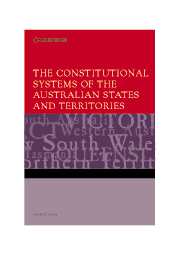Book contents
- Frontmatter
- Contents
- Table of cases
- Table of statutes
- Preface
- List of abbreviations
- Map
- 1 Introduction
- 2 Constitutional evolution of the States
- 3 The Legislature
- 4 Legislative power
- 5 Repugnancy
- 6 Manner and form
- 7 Extraterritoriality
- 8 Executive power
- 9 Republic
- 10 Judicial protection
- 11 Commonwealth territories power
- 12 Commonwealth territories
- Appendix 1 Constitutional Conventions adopted by Resolution of the Australian Constitutional Convention, Brisbane 29 July – 1 August 1985
- Appendix 2 Northern Territory (Self-Government) Regulations 1978 (Cth) – Reg 4
- Appendix 3 Australian Capital Territory (Self-Government) Act 1988 – Schedule 4
- Appendix 4 Ten Lessons from the Crisis over the Governor-General, Dr Peter Hollingworth (May 2003)
- Index
4 - Legislative power
Published online by Cambridge University Press: 16 November 2009
- Frontmatter
- Contents
- Table of cases
- Table of statutes
- Preface
- List of abbreviations
- Map
- 1 Introduction
- 2 Constitutional evolution of the States
- 3 The Legislature
- 4 Legislative power
- 5 Repugnancy
- 6 Manner and form
- 7 Extraterritoriality
- 8 Executive power
- 9 Republic
- 10 Judicial protection
- 11 Commonwealth territories power
- 12 Commonwealth territories
- Appendix 1 Constitutional Conventions adopted by Resolution of the Australian Constitutional Convention, Brisbane 29 July – 1 August 1985
- Appendix 2 Northern Territory (Self-Government) Regulations 1978 (Cth) – Reg 4
- Appendix 3 Australian Capital Territory (Self-Government) Act 1988 – Schedule 4
- Appendix 4 Ten Lessons from the Crisis over the Governor-General, Dr Peter Hollingworth (May 2003)
- Index
Summary
Introduction
This chapter focuses on the legislative power of the State and self-governing territory legislatures. State legislatures are vested with a general law-making power for their State. There is no need to characterise their enactments within any particular head of legislative power as required for Commonwealth enactments. Consequently, State laws are usually prima facie valid. They are, however, subject to invalidation for infringing a range of restrictions on power. Similarly, the Legislative Assemblies of the ACT, Northern Territory and Norfolk Island enjoy plenary legislative power, subject to various exceptions and restrictions imposed by their respective Self-Government Acts.
After considering the plenary nature of State and territory legislative power, this chapter examines the constitutional significance of the doctrine of separation of powers at the State and territory level, before outlining the restrictions on their respective powers. The restrictions on State legislative power derive principally from the Commonwealth Constitution and the Australia Acts 1986. In particular, the nature and scope of the implied freedom of political communication are examined. Note that separate consideration is given in the following three chapters to three further substantive restrictions on State power: the doctrine of repugnancy (Chapter 5); manner and form (Chapter 6); and extraterritoriality (Chapter 7). The restrictions on the legislative power of the self-governing territories derive from the Commonwealth Constitution and their Self-Government Acts. Where appropriate, reference is made to those restrictions in this chapter and in Chapters 5 to 7. Otherwise, they are dealt with in Chapters 11 and 12.
- Type
- Chapter
- Information
- Publisher: Cambridge University PressPrint publication year: 2006



